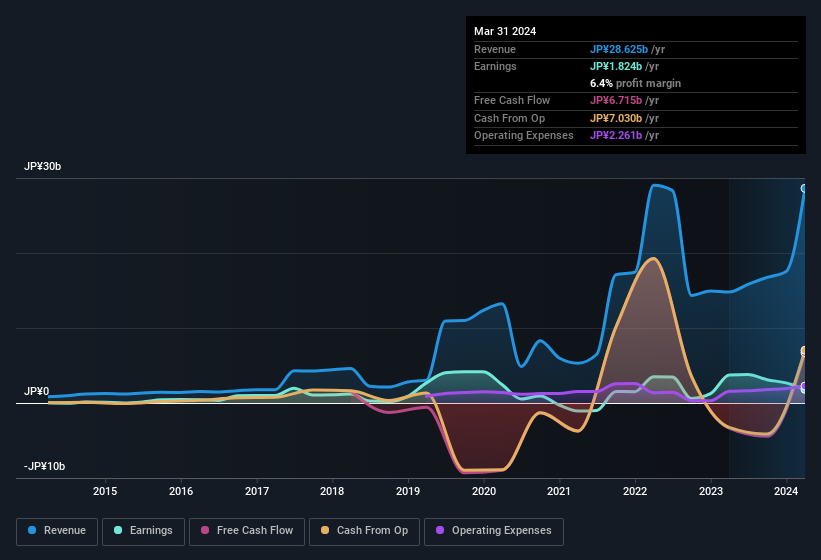- Japan
- /
- Hospitality
- /
- TSE:3772
We Think You Can Look Beyond Wealth Management's (TSE:3772) Lackluster Earnings
Investors were disappointed with the weak earnings posted by Wealth Management, Inc. (TSE:3772 ). Despite the soft profit numbers, our analysis has optimistic about the overall quality of the income statement.
See our latest analysis for Wealth Management

A Closer Look At Wealth Management's Earnings
Many investors haven't heard of the accrual ratio from cashflow, but it is actually a useful measure of how well a company's profit is backed up by free cash flow (FCF) during a given period. In plain english, this ratio subtracts FCF from net profit, and divides that number by the company's average operating assets over that period. You could think of the accrual ratio from cashflow as the 'non-FCF profit ratio'.
That means a negative accrual ratio is a good thing, because it shows that the company is bringing in more free cash flow than its profit would suggest. While it's not a problem to have a positive accrual ratio, indicating a certain level of non-cash profits, a high accrual ratio is arguably a bad thing, because it indicates paper profits are not matched by cash flow. That's because some academic studies have suggested that high accruals ratios tend to lead to lower profit or less profit growth.
Wealth Management has an accrual ratio of -0.14 for the year to March 2024. That implies it has very good cash conversion, and that its earnings in the last year actually significantly understate its free cash flow. To wit, it produced free cash flow of JP¥6.7b during the period, dwarfing its reported profit of JP¥1.82b. Notably, Wealth Management had negative free cash flow last year, so the JP¥6.7b it produced this year was a welcome improvement.
Note: we always recommend investors check balance sheet strength. Click here to be taken to our balance sheet analysis of Wealth Management.
Our Take On Wealth Management's Profit Performance
As we discussed above, Wealth Management has perfectly satisfactory free cash flow relative to profit. Based on this observation, we consider it likely that Wealth Management's statutory profit actually understates its earnings potential! Unfortunately, though, its earnings per share actually fell back over the last year. Of course, we've only just scratched the surface when it comes to analysing its earnings; one could also consider margins, forecast growth, and return on investment, among other factors. So while earnings quality is important, it's equally important to consider the risks facing Wealth Management at this point in time. For example, we've discovered 4 warning signs that you should run your eye over to get a better picture of Wealth Management.
Today we've zoomed in on a single data point to better understand the nature of Wealth Management's profit. But there are plenty of other ways to inform your opinion of a company. For example, many people consider a high return on equity as an indication of favorable business economics, while others like to 'follow the money' and search out stocks that insiders are buying. While it might take a little research on your behalf, you may find this free collection of companies boasting high return on equity, or this list of stocks with significant insider holdings to be useful.
Valuation is complex, but we're here to simplify it.
Discover if Wealth Management might be undervalued or overvalued with our detailed analysis, featuring fair value estimates, potential risks, dividends, insider trades, and its financial condition.
Access Free AnalysisHave feedback on this article? Concerned about the content? Get in touch with us directly. Alternatively, email editorial-team (at) simplywallst.com.
This article by Simply Wall St is general in nature. We provide commentary based on historical data and analyst forecasts only using an unbiased methodology and our articles are not intended to be financial advice. It does not constitute a recommendation to buy or sell any stock, and does not take account of your objectives, or your financial situation. We aim to bring you long-term focused analysis driven by fundamental data. Note that our analysis may not factor in the latest price-sensitive company announcements or qualitative material. Simply Wall St has no position in any stocks mentioned.
About TSE:3772
Proven track record with mediocre balance sheet.
Market Insights
Community Narratives



